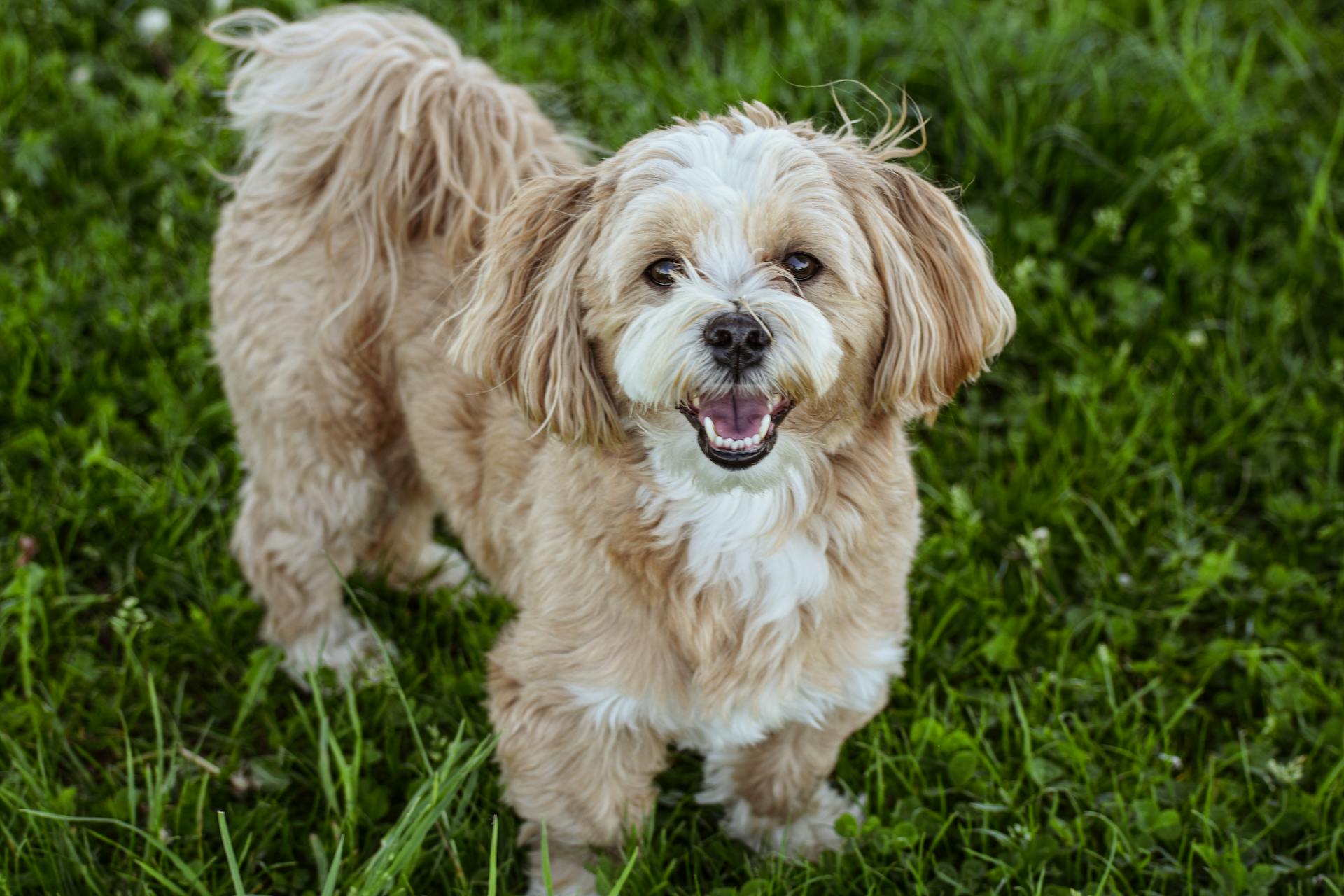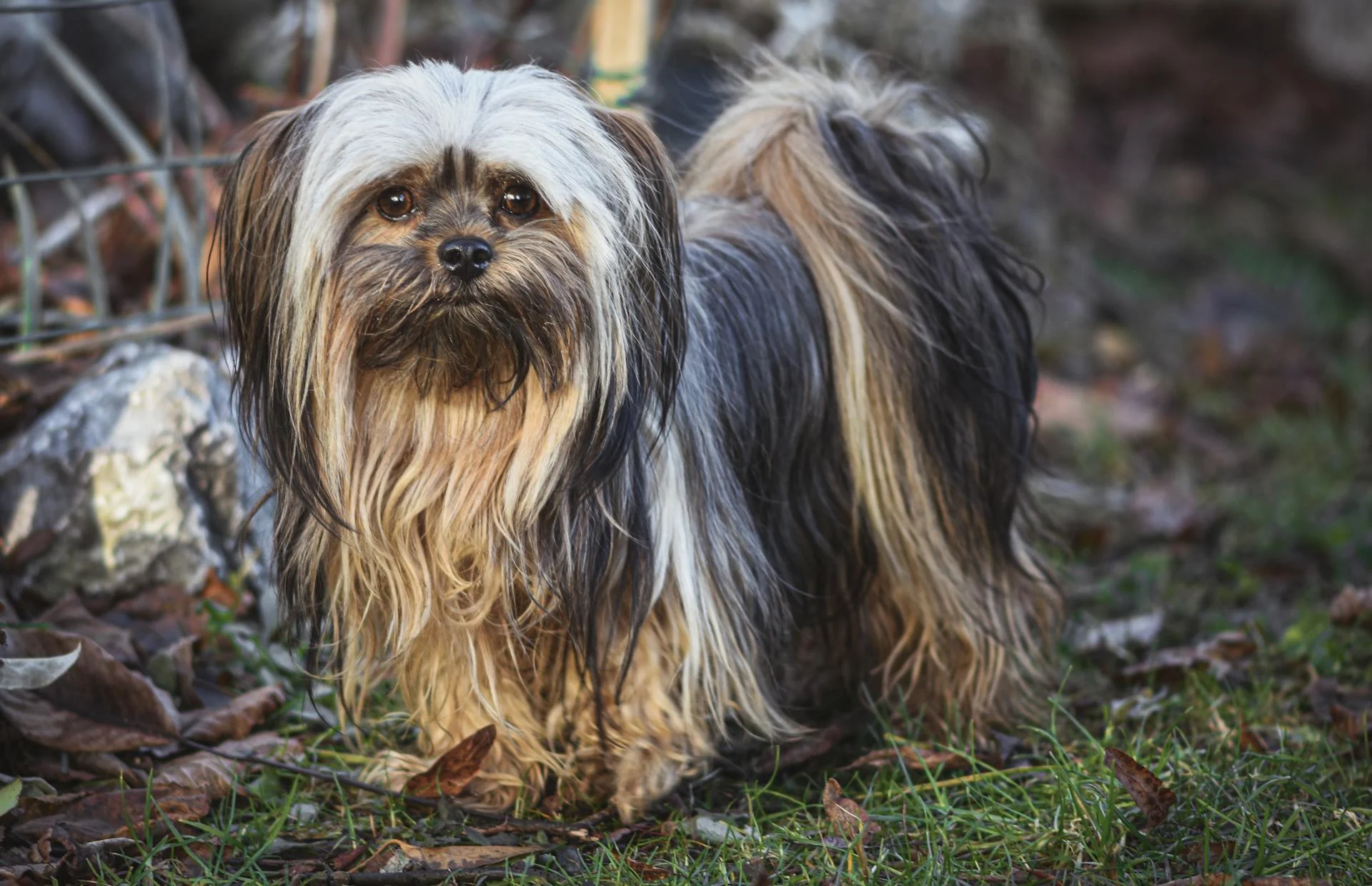
Lhasa Apsos can be prone to barking, especially if they're not properly socialized from an early age. This can be a problem for owners who live in apartments or have noise restrictions.
Lhasa Apsos are intelligent dogs and can be trained with positive reinforcement. They respond well to consistent commands and rewards.
Some Lhasa Apsos may develop fear-based behaviors, such as growling or snapping, if they're not handled gently and carefully. This can be especially true if they're not introduced to new people, places, and things in a gradual and controlled manner.
Housebreaking can be a challenge for Lhasa Apso owners, especially if they're not consistent with training and supervision.
For your interest: Is Lhasa Apso Good for First Time Owners
Lhasa Apso Basics
The Lhasa Apso is a small, fluffy dog that originated in Tibet, weighing between 13-18 pounds and standing 10-11 inches tall.
They have a long, dense coat that requires regular grooming to prevent matting and tangling.
Lhasa Apsos are known for their loyal and affectionate nature, making them great companions for families and individuals alike.
They can be wary of strangers and may take time to warm up to new people, so early socialization is crucial.
Lhasa Apsos are intelligent dogs that respond well to positive reinforcement training, but they can be stubborn at times.
They are generally quiet dogs, but they do bark to alert their owners to potential threats or to express excitement or anxiety.
With proper training and socialization, Lhasa Apsos can thrive in a variety of living situations, from apartments to homes with yards.
Caring for Your Lhasa Apso
Caring for your Lhasa Apso requires attention to her diet, exercise, and regular grooming. A high-quality diet appropriate for her age is essential.
To prevent dental problems, brush your Lhasa's teeth at least three times a week, as Lhasa Apsos often have serious issues with their teeth. This will help keep her teeth healthy and strong.
Keep your dog's diet consistent and avoid giving her people food, as this can lead to unhealthy eating habits. A consistent diet will also help prevent digestive problems.
For your interest: Shih Tzu Teeth Problems
Daily walks and short play sessions are necessary to keep your Lhasa Apso happy and healthy, especially if you live in an apartment. Aim for regular exercise, but don't overdo it at first.
To keep her long coat looking its best, brush it daily or clip it for easier care. This will prevent matting and tangling, making grooming a breeze.
Here's a quick rundown of Lhasa Apso care essentials:
- Brush teeth at least three times a week
- Keep diet consistent and avoid people food
- Provide daily walks and short play sessions
- Brush coat daily or clip for easier care
- Clean ears weekly
Regular grooming will help prevent problems and keep your Lhasa Apso looking and feeling her best.
Training and Behavior
Training is crucial for Lhasa Apsos, as they can be stubborn and require early socialization and obedience training.
Lhasa Apsos are not tolerant of children and bond to one person, which can make them a bit challenging to integrate into families with kids.
Consistently enforcing house rules is key to helping your Lhasa Apso become a perfect companion, as they can be dignified, calm, and deliberate in nature.
With proper training, most Lhasa Apsos learn to live happily with other family pets, but they can be bossy and jealous if not socialized properly.
Apso Personality Traits
The Lhasa Apso's personality is a unique blend of traits that can make them both loving and challenging companions. They're happy, lively, and assertive, with a fine sense of hearing that warns them of strangers.
Lhasas are naturally wary of those they don't know, which can make socialization a bit tricky. However, with consistent training and socialization, they can become confident and calm in new situations.
Their brashness and comical antics can give the impression that they're cuddly lapdogs, but don't be fooled – Lhasas are strong-willed and independent. They need consistent house rules and boundaries to thrive.
They're playful, dignified, calm, and deliberate in nature, which can make them great companions for the right owner. With patience, love, and proper training, you can develop a strong bond with your Lhasa Apso.
However, Lhasas are not tolerant of children and tend to bond strongly with one person, so they may not be the best fit for families with multiple kids. With other animals, they can be bossy and jealous, but with proper training, they can learn to live harmoniously with other pets.
Exercise Requirements
Daily walks and playtime in a secure yard provide the necessary physical exercise for Lhasa Apsos.
Lhasa Apsos need daily walks and playtime to stay happy and healthy. They have ample energy and enthusiasm, so regular exercise is crucial.
Engaging in interactive games and puzzle toys can satisfy their mental stimulation needs, preventing boredom and destructive behaviors.
Interactive games and puzzle toys are a great way to keep your Lhasa Apso's mind active, which is key to a happy and healthy life.
Obedience training is also essential to enhance their mental acuity and strengthen the bond between you and your pup.
Incorporating obedience training into their routine can make a big difference in your Lhasa Apso's behavior and overall well-being.
Training
Training is crucial for a pet's development and well-being. Early socialization is key to helping them become confident and calm in new situations.
They can be stubborn, so early training is essential to establish good habits. Consistency and patience are vital in this process.
Early obedience training helps pets learn basic commands and respect boundaries, making them easier to manage. This can be a challenging but rewarding experience for both pet and owner.
Featured Images: pexels.com

